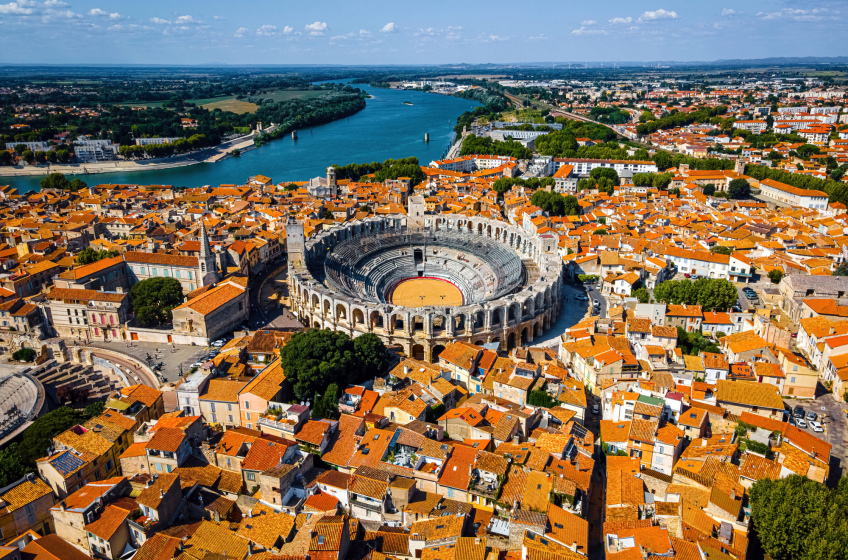Discover Arles | A Visitor's Introduction to Arles
Arles is a city that effortlessly blends its rich Roman heritage with a vibrant contemporary culture. Known for its well-preserved ancient monuments, its connection to Vincent van Gogh, and its lively arts scene, Arles is a captivating destination that offers a unique blend of history, art, and Provençal charm.
Recommended Arles Accommodation: Hotels
Arles' Roman Heritage
Arles is renowned for its impressive Roman monuments, many of which are UNESCO World Heritage sites. The Arles Amphitheatre (Les Arènes), built in the 1st century AD, is one of the city's most iconic landmarks. This ancient arena once hosted gladiator battles and now serves as a venue for concerts, bullfights, and festivals. Nearby, the Roman Theatre is another testament to Arles' ancient past, where visitors can explore the ruins and imagine the grandeur of Roman performances.
The Alyscamps, a vast Roman necropolis, is a hauntingly beautiful site lined with ancient sarcophagi and cypress trees. For a deeper dive into the city's history, the Arles Museum of Antiquity (Musée de l'Arles et de la Provence Antiques) offers a comprehensive collection of Roman artifacts, including a remarkable Roman barge that was excavated from the Rhône River.
Vincent van Gogh's Legacy
Arles is famously associated with Vincent van Gogh, who lived in the city from 1888 to 1889. During his time here, van Gogh produced over 300 paintings and drawings, many of which are among his most famous works. The Fondation Vincent van Gogh in Arles celebrates this connection, showcasing contemporary art exhibitions inspired by van Gogh's legacy. Visitors can also follow the Van Gogh Trail, which includes reproductions of his paintings displayed at the actual sites where he painted them, such as the Café Terrace at Night and the Yellow House.
Architectural and Cultural Highlights of Arles
The Church of St. Trophime is a masterpiece of Romanesque architecture, with its stunning façade and intricately carved cloisters. The church, which dates back to the 12th century, is a must-see for its beautiful stonework and historical significance.
Arles is also home to a dynamic arts scene, with numerous galleries and cultural events. The Rencontres d'Arles, an international photography festival held annually in the summer, is one of the most prestigious photography events in the world. This festival transforms the city into an open-air gallery, with exhibitions in historic buildings, public spaces, and unconventional venues.
The Camargue
Just a short drive from Arles is the Camargue, a unique natural region known for its wild landscapes, salt marshes, and diverse wildlife. The Parc Naturel Régional de Camargue is a haven for birdwatchers, with its population of flamingos, herons, and other bird species. The Camargue is also famous for its white horses and black bulls, which can be seen roaming freely. Visitors can explore the region by horseback, bicycle, or guided tours.
Provençal Charm and Cuisine
Arles exudes the charm of Provence, with its narrow streets, colourful markets, and lively squares. The Place du Forum and Place de la République are bustling hubs where locals and visitors alike gather to enjoy a coffee or a meal. The Arles Market, held twice a week, is one of the largest in Provence, offering a delightful array of local produce, cheeses, olives, and other regional specialties.
The culinary scene in Arles reflects the flavors of Provence and the Mediterranean. Don’t miss the chance to savour traditional dishes such as gardianne de taureau (bull stew), brandade de morue (salt cod purée), and ratatouille. Many restaurants in Arles focus on using fresh, locally-sourced ingredients, providing an authentic taste of the region.
Practical Tips
Arles is accessible by train, with regular services from major cities like Paris, Marseille, and Avignon. The city’s compact size makes it easy to explore on foot, and many of the main attractions are within walking distance of each other. For accommodation, Arles offers a range of options from charming boutique hotels to rustic guesthouses. The best times to visit are in the spring and autumn when the weather is pleasant and the crowds are smaller.
Shortlist
- Your Shortlist is empty

